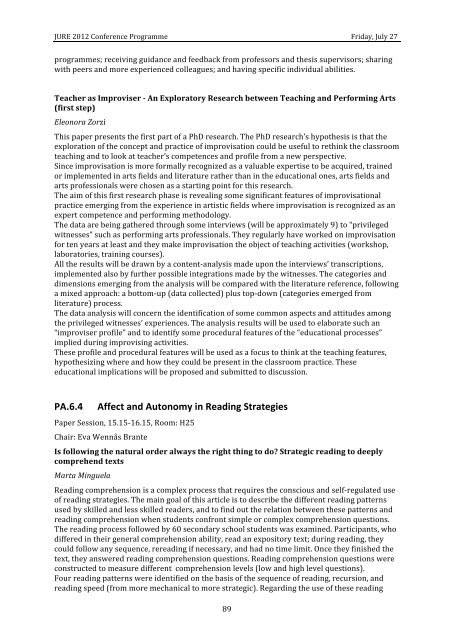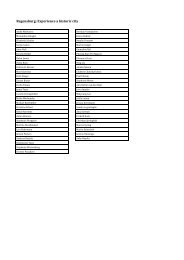JURE 2012 Programme book - EARLI Jure 2012
JURE 2012 Programme book - EARLI Jure 2012
JURE 2012 Programme book - EARLI Jure 2012
Create successful ePaper yourself
Turn your PDF publications into a flip-book with our unique Google optimized e-Paper software.
<strong>JURE</strong> <strong>2012</strong> Conference <strong>Programme</strong> Friday, July 27<br />
programmes; receiving guidance and feedback from professors and thesis supervisors; sharing<br />
with peers and more experienced colleagues; and having specific individual abilities.<br />
Teacher as Improviser -‐ An Exploratory Research between Teaching and Performing Arts<br />
(first step)<br />
Eleonora Zorzi<br />
This paper presents the first part of a PhD research. The PhD research’s hypothesis is that the<br />
exploration of the concept and practice of improvisation could be useful to rethink the classroom<br />
teaching and to look at teacher’s competences and profile from a new perspective.<br />
Since improvisation is more formally recognized as a valuable expertise to be acquired, trained<br />
or implemented in arts fields and literature rather than in the educational ones, arts fields and<br />
arts professionals were chosen as a starting point for this research.<br />
The aim of this first research phase is revealing some significant features of improvisational<br />
practice emerging from the experience in artistic fields where improvisation is recognized as an<br />
expert competence and performing methodology.<br />
The data are being gathered through some interviews (will be approximately 9) to “privileged<br />
witnesses” such as performing arts professionals. They regularly have worked on improvisation<br />
for ten years at least and they make improvisation the object of teaching activities (workshop,<br />
laboratories, training courses).<br />
All the results will be drawn by a content-‐analysis made upon the interviews’ transcriptions,<br />
implemented also by further possible integrations made by the witnesses. The categories and<br />
dimensions emerging from the analysis will be compared with the literature reference, following<br />
a mixed approach: a bottom-‐up (data collected) plus top-‐down (categories emerged from<br />
literature) process.<br />
The data analysis will concern the identification of some common aspects and attitudes among<br />
the privileged witnesses’ experiences. The analysis results will be used to elaborate such an<br />
“improviser profile” and to identify some procedural features of the “educational processes”<br />
implied during improvising activities.<br />
These profile and procedural features will be used as a focus to think at the teaching features,<br />
hypothesizing where and how they could be present in the classroom practice. These<br />
educational implications will be proposed and submitted to discussion.<br />
PA.6.4 Affect and Autonomy in Reading Strategies<br />
Paper Session, 15.15-‐16.15, Room: H25<br />
Chair: Eva Wennås Brante<br />
Is following the natural order always the right thing to do? Strategic reading to deeply<br />
comprehend texts<br />
Marta Minguela<br />
Reading comprehension is a complex process that requires the conscious and self-‐regulated use<br />
of reading strategies. The main goal of this article is to describe the different reading patterns<br />
used by skilled and less skilled readers, and to find out the relation between these patterns and<br />
reading comprehension when students confront simple or complex comprehension questions.<br />
The reading process followed by 60 secondary school students was examined. Participants, who<br />
differed in their general comprehension ability, read an expository text; during reading, they<br />
could follow any sequence, rereading if necessary, and had no time limit. Once they finished the<br />
text, they answered reading comprehension questions. Reading comprehension questions were<br />
constructed to measure different comprehension levels (low and high level questions).<br />
Four reading patterns were identified on the basis of the sequence of reading, recursion, and<br />
reading speed (from more mechanical to more strategic). Regarding the use of these reading<br />
89



